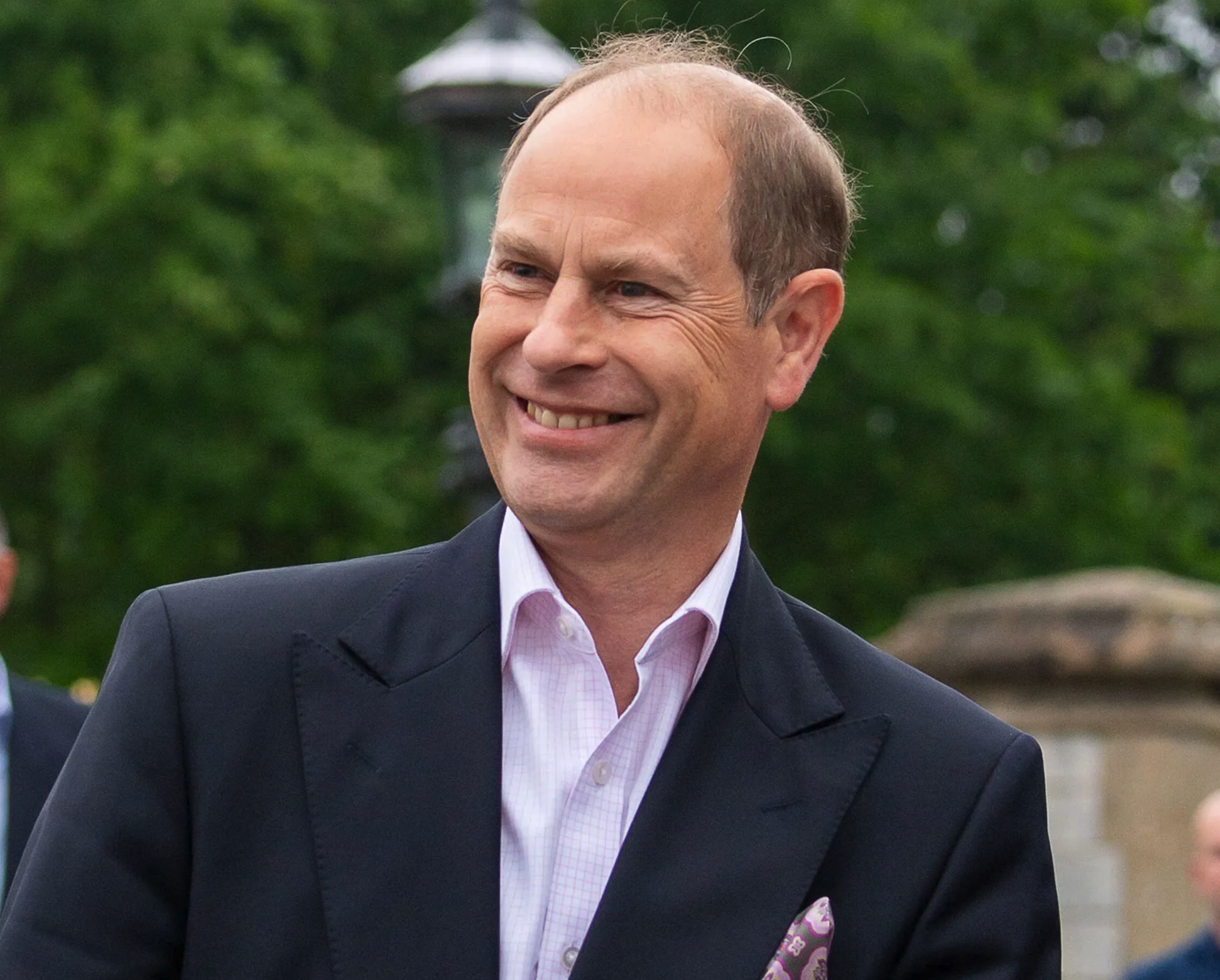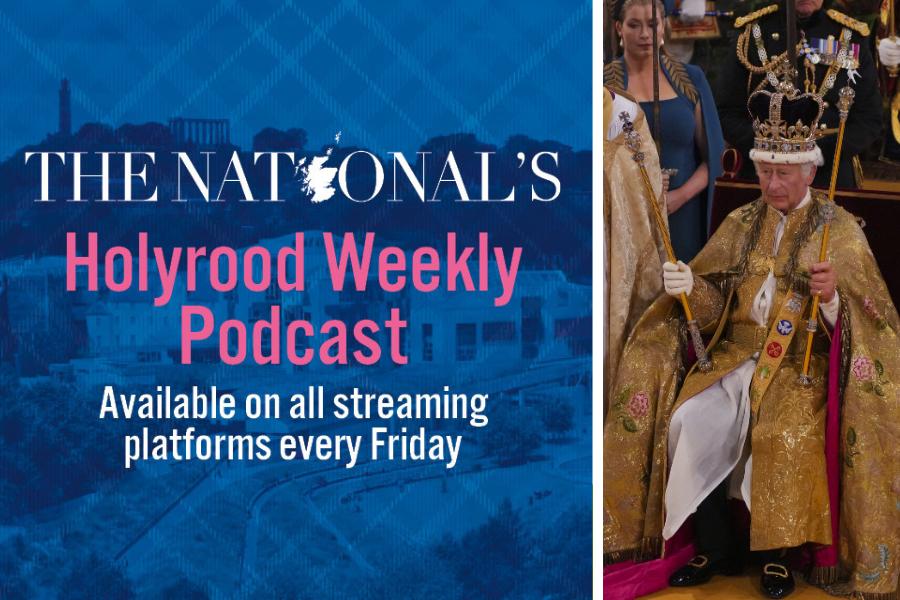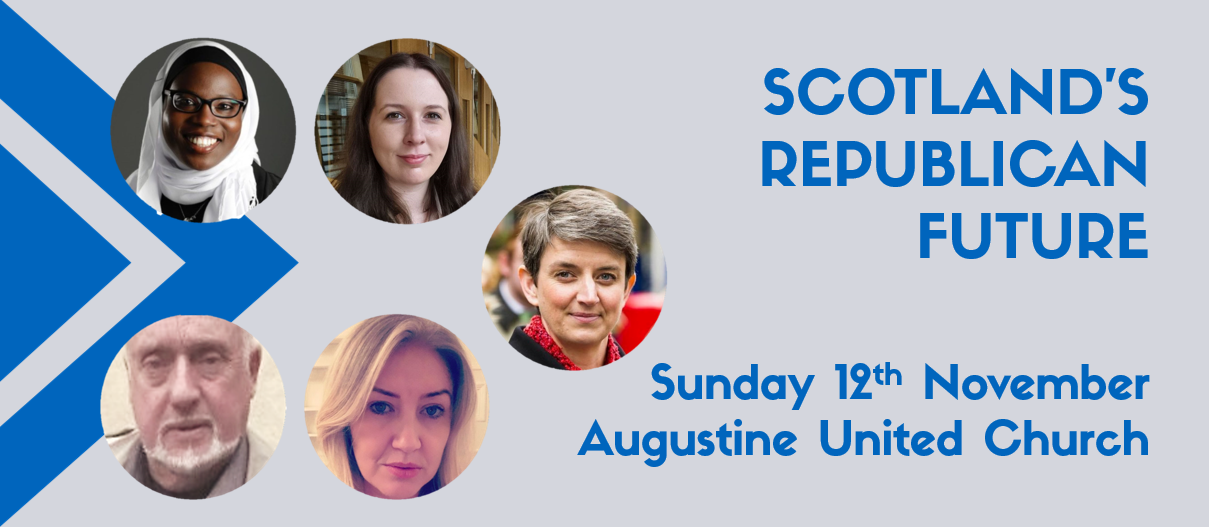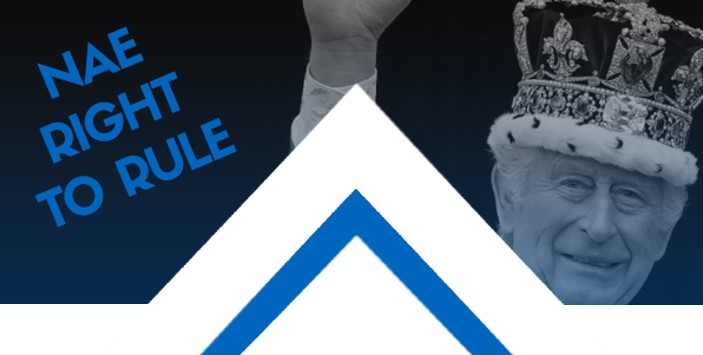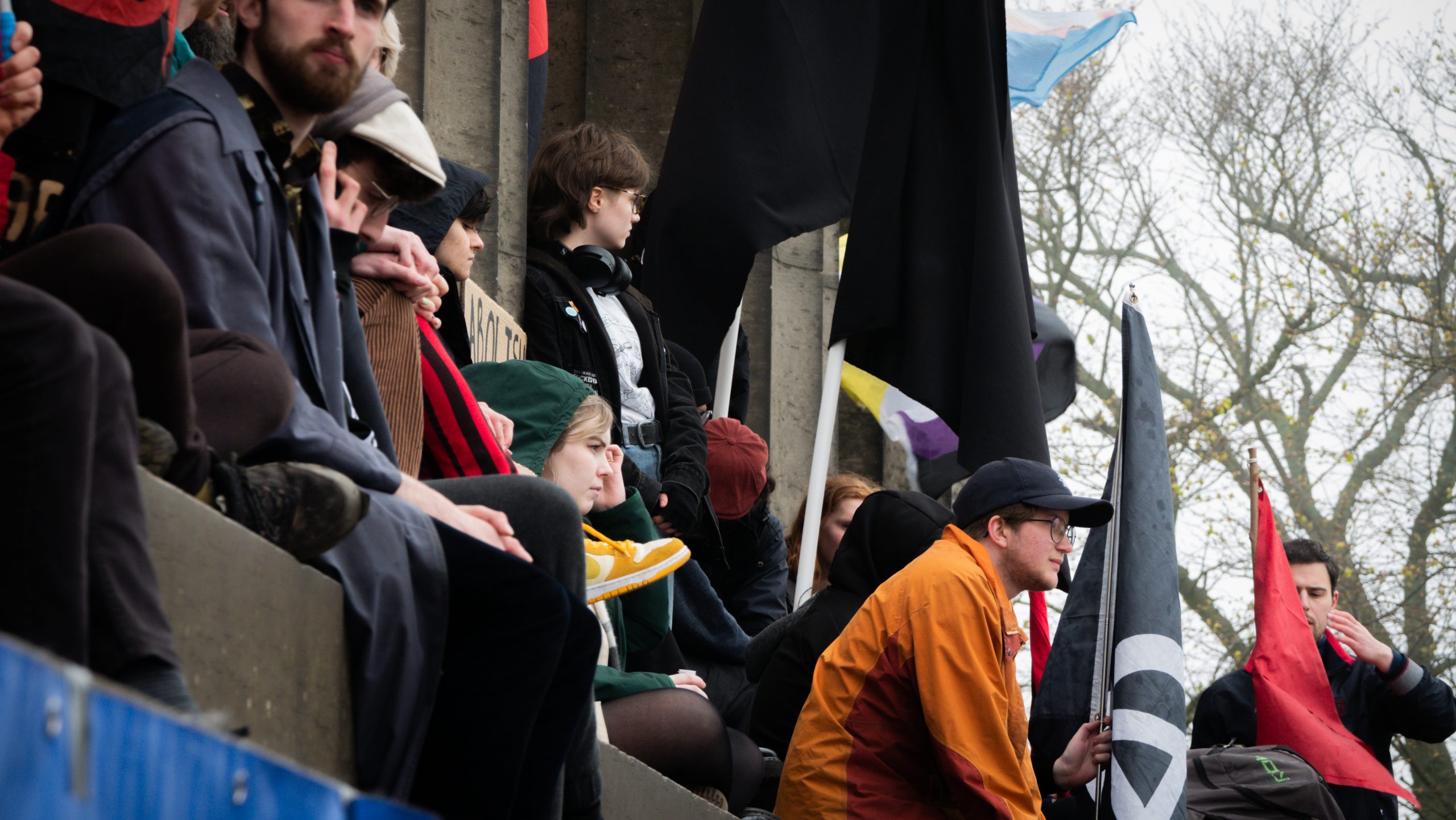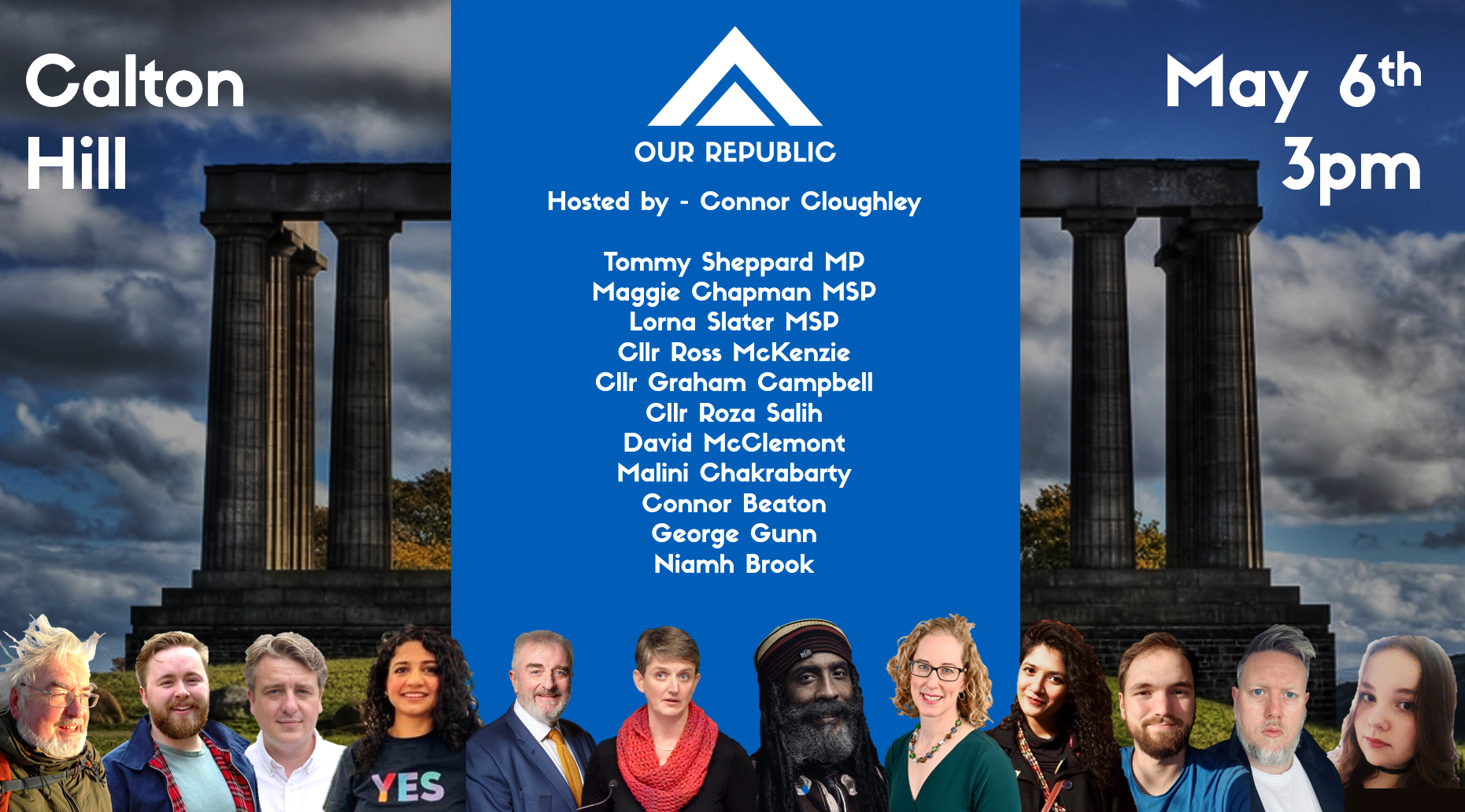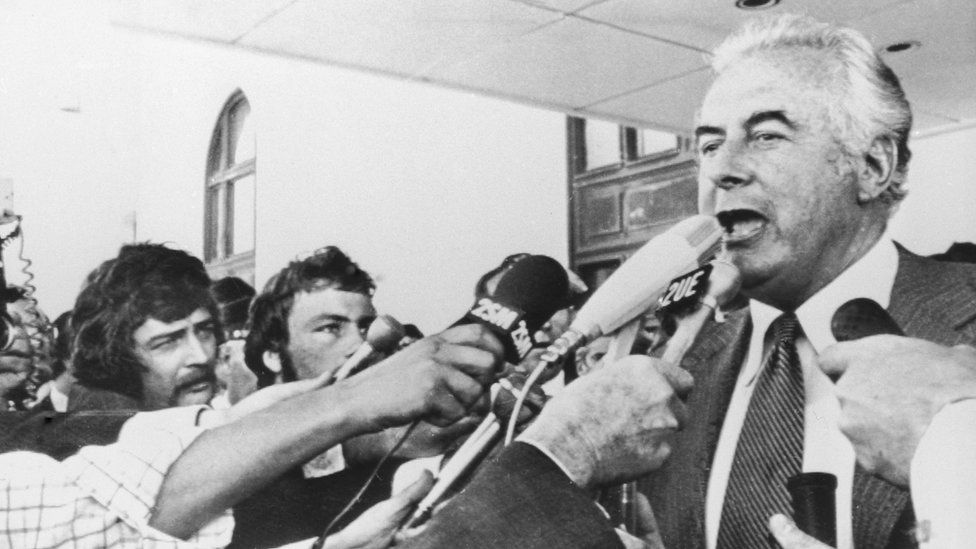
Guest blog by Allan Armstrong, Radical Independence Campaign
Republicanism – anti-monarchism or the sovereignty of the people
When it comes to the term ‘Crown’, most people understand this to be the same as the monarchy. When asked why they oppose the British monarchy, its opponents usually concentrate their criticism on the antiquated class structure this upholds, and the high cost of maintaining such a parasitic institution, especially now the rest of us face austerity.
However, the UK is a constitutional monarchy. This means the queen exerts little power in her own right. Yes, the royal family enjoys obscene privileges in terms of property, income and status, and exerts considerable political pressure behind-the-scenes to maintain these; but these are rewards given for its role in supporting and promoting the interests of a wider British ruling class.
Far more important than the monarchy, or the royal family, is the political system it fronts. Despite the existence of a formal parliamentary democracy, centred on Westminster, with its devolved offspring at Holyrood, Cardiff Bay and Stormont, we still face some very real political constraints. These lie in the state’s profoundly anti-democratic Crown Powers, which derive from sovereignty lying with the Crown-in-Westminster. Our counter to this is upholding
republicanism as the sovereignty of the people.
This also represents a challenge to those who only see the absence a monarchy as the essence of republicanism. This is why we also oppose the republicanism represented by the imperial presidencies of Trump and Bidens’ US Republic and Macron’s French Republic; Putin’s ‘One and Indivisible’, oligarchical Russian Federated Republic, the one-party bureaucratic police states of Xi Jinping’s Chinese Peoples Republic and Kim Jong-un’s Democratic People’s Republic of North Korea; and the theocratic republicanism of the mullahs of Iran. None of these are based on the democratic principle of the sovereignty of the people.
The UK state’s use of the Crown powers
So, how have the Crown powers influenced politics and society throughout the UK, but also specifically in Scotland? The Crown powers shield a whole host of unsavoury institutions and practices from any public accountability or even scrutiny. They are needed to guarantee continued British ruling class control. This class is made up from the leaders of finance, commerce, industry, the armed forces, judiciary, senior civil servants and key politicians.
In 2004, the New Labour government deigned to publicise some of these powers. However, they still kept others secret – so we don’t even know the full extent of what we are up against! New Labour regularly resorted to these powers, most notoriously in the war in Iraq. Tory and Labour governments have used these powers to mobilise troops to break firefighters’ strikes in 1997 and 2002. These powers also cloak the activities of the City of London in secrecy.
We can also look at other measures sanctioned under the Crown Powers. In 2012, Guardian journalist, Ian Cobain, published Cruel Britannia: A Secret History of Torture. This shows how the UK state has been able to cover up its continuous use of inhuman treatment, and falsely claim it is not engaged in such practices. Under the Crown Powers, even democratically elected governments can be toppled. Back in 1975, Gough Whitlam fronted a mildly reforming Labour government, which wanted to keep US nuclear warships out of Australian ports. He felt the long arm of the Crown Powers when the British Governor-General removed him from his elected office. The incumbent British Labour government did nothing to help, highlighting Labour’s almost total acceptance of the UK’s anti-democratic state.
In 1999, under New Labour, the Crown Powers were used to deny the right of the Diego Garcia islanders to return to their Indian Ocean home, when they won their case in the British High Court.
Unfortunately for them, Diego Garcia is now the site of a major US military base.
However, these powers go even further. They even allow for the suspension of Parliament in ‘extreme situations’, with resort instead to direct rule by the Privy Council. This very select band of former and existing senior government ministers is chosen for its reliability in upholding ruling class interests. Its members all enjoy close contact with the world of business, whilst some have had direct dealings with military officers, MI5 and MI6.
But only three inner members of the Cabinet are needed to form a quorum for the Privy Council to make a decision. We saw this in Boris Johnson’s attempt to prorogue Westminster in 2019. In this case another profoundly anti-democratic UK institution, the Supreme Court over-rode the Privy Council. And you might have thought that Johnson’s attempted parliamentary coup would have led to his instant dismissal. But instead, he was only asked to apologise to the queen and allowed to get on with his plan B ‘Get Brexit Done’ general election.
Compare this with the Supreme Court’s handing of the Scottish government’s Section 30 appeal to go ahead with ‘IndyRef2’, as the majority of Scottish voters elected them to do in the 2021 Holyrood election. Or the overriding of Gender Reform Recognition approved by a large majority of MSPs at Holyrood including four Tories.
The Crown Powers and national democratic challenges
A significant element of the UK constitution is its Unionism. The 1707 Act of Union for Scotland and the 1801 Act of Union for Ireland were both designed to buttress the British Empire. Union and Empire go hand in hand. And whenever national democratic challenges are made to the UK set-up, the British ruling class quickly resorts to the Crown Powers.
In 1969, the UK state refused to make any serious attempt to dismantle its sectarian ‘apartheid’ statelet in Northern Ireland, when challenged by the Civil Rights Movement. After forcing this movement off the streets by gunning down 13 unarmed demonstrators in Derry in 1972, the full force of her majesty’s regiments was brought to bear on Irish republicans and nationalists. This included the SAS, the UDR (with its royal patronage) the RUC, and the Loyalist death squads, all backed up by juryless Diplock Courts, manned by Unionist judges, and ready to enforce detention as
required in ‘her majesty’s’ special prisons.
Those sections of the state, which provide the ruling class with legal sanction to pursue its own ends, are prefixed ‘her majesty’s’ or ‘royal’. Whilst self-styled Loyalists include those who are prepared to undertake certain illegal tasks when called upon by the security services.
But surely, we can take some comfort from the fact that the British ruling class did not resort to such violent measures when the issue of Scottish self-determination was raised in the late 1970s? However, before the mid 1990s, when the majority of the British ruling class concluded that ‘Devolution-all-round’ (for Scotland, Wales and Northern Ireland) was the best strategy to defend its interests in these islands and the wider world, many were bitterly opposed even to very mild constitutional reform.
Therefore, in the lead-up to the 1979 Devolution Referendum, the ‘non-political’ Queen was wheeled out to make a Christmas broadcast attacking Scottish nationalism. Senior civil servants were told to ‘bury’ any documents, which could help the Scottish nationalists. Military training exercises were conducted, targeting putative armed Scottish guerrilla forces. The security forces became involved on the nationalist fringe, encouraging anti-English diatribes and actions, to discredit any notion of real Scottish self-determination. But it was not necessary to resort to more of the Crown Powers, because the Labour government was divided, and the SNP’s challenge was so mild and constitutionalist, the ruling class did not have to go any further.
So, how did the British ruling class use those Crown Powers in the 2012-14 referendum campaign? They achieved their first objective, under the Edinburgh Agreement signed between the Westminster and Holyrood government. Alex Salmond, himself a Privy Councillor, agreed to the referendum being conducted under Westminster rules.
This meant that the official’ Yes’ campaign had to be conducted under much greater official restrictions than the ‘No campaign’, which was able to draw upon those Crown Powers hidden from public scrutiny.
It will take thirty years before we officially know what methods were resorted to, beyond the obviously partisan use of senior civil servants and the BBC. However, the Guardian exposed moves by the Ministry of Defence to have Faslane Trident base declared sovereign UK territory in the event of a ‘Yes’ vote.
If there had been a ‘Yes’ vote on September 18th, the SNP government did not recognise this as transferring sovereignty to the people of Scotland. They accept the principle that their sovereignty comes from those powers devolved from Westminster to Holyrood. Hence, they had already decided that their negotiating team with Westminster would include MSPs from the Labour, Conservative and Lib-Dem parties, and possibly even some of their Scottish MPs. The low level of Scottish self-determination, already accepted under the SNP government’s ‘Independence-Lite’ proposals, would have been further whittled away under Westminster sovereignty.
Conclusion
In contrast, the Radical Independence Campaign, at its May 17th, 2014 National Forum, drew up a very different set of proposals in the event of a ‘Yes’ vote. These involved making a direct appeal to all those autonomous ‘Yes’ campaigning groups to join a popular campaign to draw up a new Scottish constitution to be put before a Scottish constituent assembly.
A ‘Yes’ vote on September 18th, would have been seen as an exercise in the republican principle of sovereignty of the Scottish people. The sovereignty of the people was no longer an abstract constitutional issue. There were many vibrant campaigning organisations the length and breadth of Scotland and beyond, constituting a civic national, internationalism from below, rainbow alliance. These included the Radical Independence Campaign, Women for Independence, Pensioners for Independence, Africans for an Independent Scotland, English People for Independence, Scots Asians for Independence, and many local ‘Yes’ groups which acted independently of ‘Yes Scotland’. There was a vibrant alternative media, e.g. bella caledonia and the National (and the wonderful, Let a Thousand Flowers Bloom). And there was an equally vibrant cultural alternative promoted by the National Collective (Imagine a Better Scotland),
with its Yestivals held across Scotland.
Together these challenged the UK government, Better Together and the official SNP front ‘Yes Scotland’, The republican rally on Calton Hill on May 6th provides us with an opportunity to revive that and rekindle Scotland’s unfinished democratic revolution.


